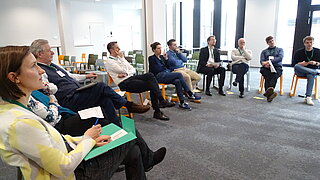Lusatian expertise at world hydrogen derivatives conference
Copyright: Worldhydrogenleaders
Experts from the PtX Lab Lausitz are promoting sustainably produced synthetic fuels and their prioritised use in air and maritime transport.
The hydrogen economy is central to the defossilisation of economic sectors that cannot be converted to direct electric processes and drives on a large scale in the near future. This applies to transport, for example, and in particular to aviation and shipping. There, climate-neutral fuels based on renewable energies and green hydrogen are urgently needed. However, these cannot always be produced locally.
The first World Hydrogen Derivatives Conference, which took place as part of World Hydrogen Week in Rotterdam at the beginning of October 2023, looked at the various options for transporting hydrogen over long distances. Hydrogen carriers such as ammonia and low carbon hydrogen carriers (LOHC) played an important role. Technical advances in ammonia cracking, the separation of hydrogen from ammonia, were also presented and discussions were held on which hydrogen-based fuels are likely to become established in shipping. Many experts agree that e-methanol will be important for the maritime industry in the short term. In the medium and long term, e-ammonia will serve as a replacement for heavy fuel oil and fossil marine diesel.
In dialogue with the international hydrogen economy
Over 3,000 international stakeholders from the hydrogen economy responded to the call to Rotterdam, including two representatives from PtX Lab Lausitz. They focussed on the embedded, two-day exchange on hydrogen derivatives. The World Hydrogen Derivatives Conference, which brought together around 200 participants from science and industry, primarily from the EU, the UK and the USA, was characterised by an optimistic mood. This is hardly surprising given the technical progress and the many new business models that have emerged for PtX projects in recent years, many of which are close to the final investment decision.
Anita Demuth, deputy director, and Anja Paumen, speaker specialising in sustainability and resources, were on site for the PtX Lab Lausitz. They presented the work of the Lusatian Think and Do Tank in two different panels and actively participated in the discussions. In her round table, Anita Demuth focussed on certifications and standards in relation to hydrogen derivatives. In addition to identifying areas of certification in need of reform, she also focussed on business opportunities and possible approaches to promoting market growth. Anita Demuth positioned herself as follows:
"In order to gain the trust of consumers for sustainably produced synthetic fuels, the market needs a framework of robust product standards and certification systems."
"Statutory or private standard setters should think in terms of the goal: What should be achieved by 2050? How and when do the criteria have to be adjusted step by step without overburdening manufacturers and at the same time constantly increasing the level of ambition?" Based on these questions, she concluded by submitting proposals for short and long-term PtX sustainability criteria, which will be further developed in dialogue with stakeholders.
The panel, in which Anja Paumen represented the position of the PtX Lab Lausitz, focussed primarily on hydrogen-based fuels and raw materials such as e-ammonia, e-methanol and synthetic e-kerosene (PtX products), their potential uses and areas of application, particularly in the transport sector. In the technical exchange, Anja Paumen made it clear that the sales market for PtX products is only just developing. As a result, they require a greater willingness to take risks on the part of all those involved and usually involve high investment costs. "Under these conditions, it makes sense to utilise the necessary resources such as finances, renewable energy, land and skilled workers in a way that is as beneficial to society as possible.
"PtX products should therefore be used first and foremost where there are no alternatives in order to quickly become independent of petroleum-based fuels and base materials."
The PtX Lab Lausitz supports prioritising the areas of application for PtX products. "Priority is given to aviation and shipping, which cannot be converted to direct electric processes and drives in the near future, as well as the chemical industry," continues Anja Paumen.
About World Hydrogen Week
The five-day World Hydrogen Week 2023 in Rotterdam was dedicated to the global hydrogen value chain. The focus was on knowledge exchange, innovations in the hydrogen industry and networking with the aim of achieving a net-zero economy.
Contact
Anita Demuth
Head of Section PtX Mobility
+49 152 28 400 735
Write E-Mail
more information
![[Translate to English:]](/fileadmin/_processed_/f/5/csm_Harry_aireg_Buehne_67a0478051.jpg)
